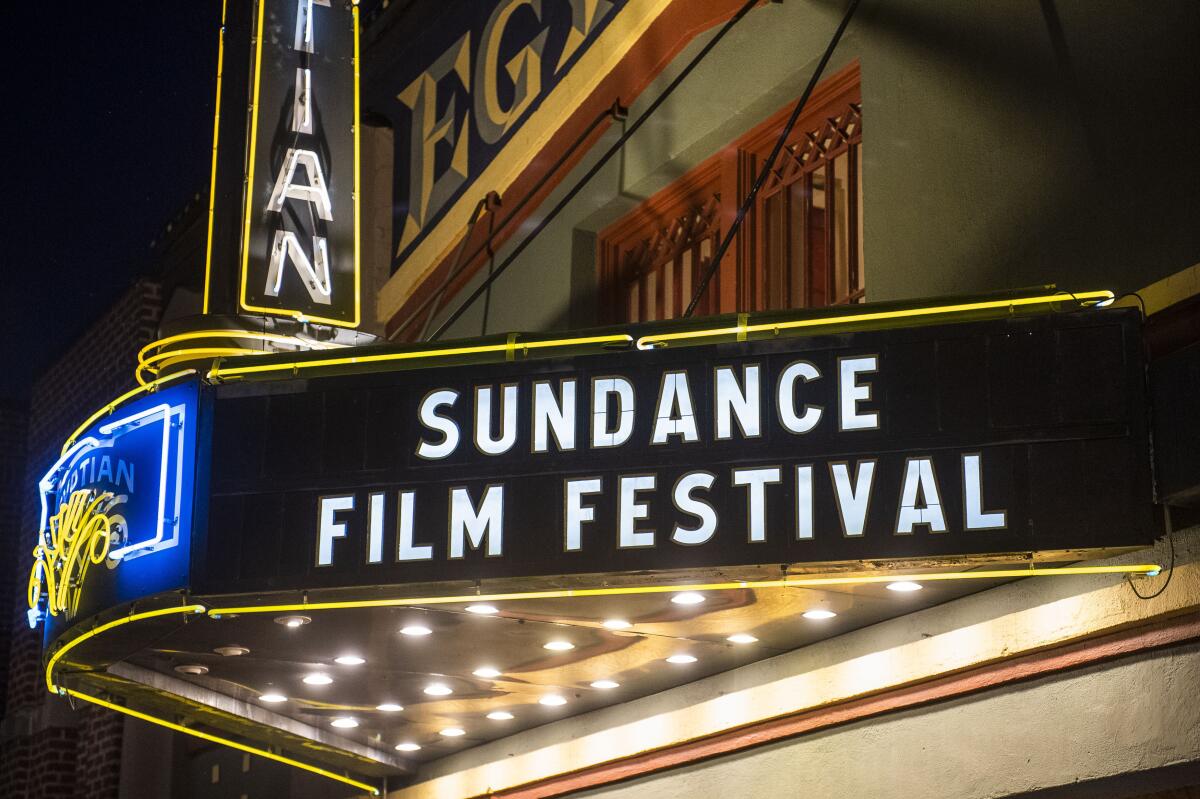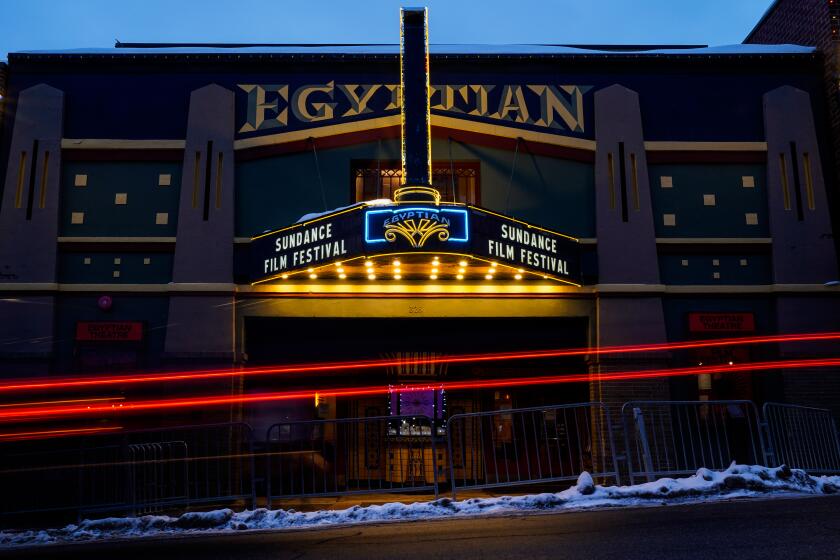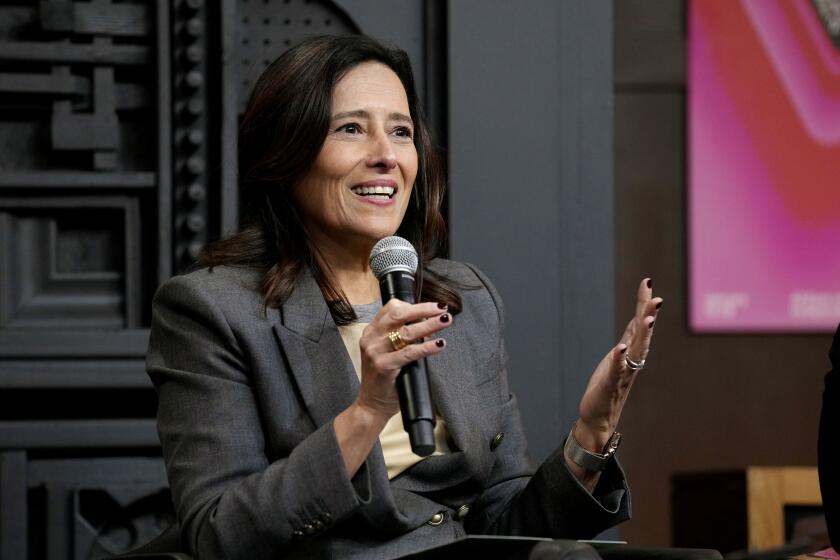Will a post-strike Sundance see a deal surge? What insiders are saying about the indie film market

With film executives, directors and actors gathered in Park City, Utah, this week for the 40th Sundance Film Festival, a big question looms: How much will a belt-tightened Hollywood, coming out of two historic strikes, be willing to pay this year for its indie movie favorites?
This year, buyers will eagerly view star-laden films including Kristen Stewart and recent Emmy winner Steven Yeun in the futuristic romance “Love Me”; Jesse Eisenberg and Kieran Culkin (also coming off an Emmy win) in the buddy dramedy “A Real Pain”; Pedro Pascal in the action drama “Freaky Tales”; David Schwimmer in the dramedy “Little Death”; and Saoirse Ronan in the memoir adaptation “The Outrun.”
Inside the business of entertainment
The Wide Shot brings you news, analysis and insights on everything from streaming wars to production — and what it all means for the future.
You may occasionally receive promotional content from the Los Angeles Times.
It’s difficult to predict which films may capture buyers’ interest and leave the festival with a massive deal or go on to become a best picture Oscar contender.
With enough luck, a smart festival purchase can pay off in a big way. Few people, if any, expected the 2021 Sundance entry “CODA,” which Apple picked up for $25 million, to take the top prize the following year at the Academy Awards. On the other hand, promising films can leave a studio with an egg on its face, as when Searchlight Pictures took Sundance acquisition “Magazine Dreams” off its release schedule amid actor Jonathan Majors’ legal troubles.
The total film count for the 2024 festival is smaller than last year’s program. This year, 82 feature films will show at Sundance, compared to the 110 full-length movies that screened at the 2023 fest, which included buzzy titles like Celine Song’s “Past Lives,” Chloe Domont’s corporate thriller “Fair Play” and Molly Gordon and Nick Lieberman’s comedy “Theater Camp.”
There’s always something striking slated for the Sundance Film Festival — sometimes even making it to the Oscars. It’s just hard to predict which ones they’ll be.
Some high-profile titles are arriving with distribution already in place, such as “Frida,” a documentary about the artist Frida Kahlo that Amazon picked up; “Hit Man,” a true-crime drama starring Glen Powell that went to Netflix; and “Love Lies Bleeding,” a bodybuilder romance released by A24 that will be Stewart’s second Sundance premiere this year.
But there’s reason to believe the market could be frothy, according to film business insiders. Buyers and sellers will enter the indie film market at a time when studios are eager to fill calendar gaps caused by strike-delayed production.
Major tentpoles originally scheduled for release this year, like Walt Disney Co.’s “Snow White” remake with Rachel Zegler, Marvel Studios’ “Fantastic Four” and Paramount’s “Mission: Impossible — Dead Reckoning Part Two,” have been pushed to 2025. The overall lighter output this year gives the film studios more of an incentive to potentially fill their calendars with Sundance acquisitions.
With the added demand for completed films, there could be a more competitive market at the festival, said CAA Media Finance agent Christine Hsu.
“Buyers are already telling us, ‘We do need to be looking at finished films, we’re really wanting to be opportunistic, but the quality has to be there,’ and that’s what creates that great competitive environment where things really pop off in the market,” Hsu said.
Another reason traditional studio buyers might be ready to bid more aggressively at Sundance is the renewed signs of life at the box office, thanks to the surprisingly strong showings of “Barbie” and “Oppenheimer,” as well as indie releases including Angel Studios’ “Sound of Freedom,” Focus Features’ “The Holdovers,” A24’s “Talk to Me” (a 2023 Sundance pickup) and Searchlight’s “Poor Things.”.
Streaming services also need content to fill their release schedules. Netflix and Apple are often active bidders at Sundance, and that’s not expected to change this year, especially as streamers look to more cost-effective acquisitions or licensing deals to fill out libraries.
“Now, whether it’s the lack of production that got made or they finally looked at how they want to spend their own money, [streamers are] ready to license ... again to multiple different studios, and that’s really helpful to the independent ecosystem,” said Deborah McIntosh, head of WME Independent.
The Sundance Film Festival just announced its 2024 lineup, an edition marked by returning heroes like Steven Soderbergh as well as a host of promising new voices.
And even as studios and streamers pare down programming slates as part of a larger effort to reduce costs, the indie route could be seen as a more cost-effective way to fill out a slate. Benjamin Kramer, co-head of CAA’s media finance department, argues that the indie market can actually benefit when the studios and streamers are working with tighter budgets.
A studio may be able to spend less money by acquiring an indie film for seven to eight figures, compared to funding an entire film from start to finish. There’s also the benefit of a faster turnaround, since the indie film is already complete and ready for release by the time of its purchase — a clear benefit for studios and streamers looking to fill out calendars hampered by the strikes.
“Even if someone’s spending $10 million to $20 million on a film, that requires a lot less modulation than studios deciding if they’re going to pull triggers on $200-million films or limited series,” Kramer said.
Ross Fremer, an executive at entertainment management, sales and advisory firm Cinetic Media, said he expects distributors to make more rational bids based on what their audiences want, rather than factors such as star power.
“I think buyers are going to be more tactical and [make] buys on what they think is going to move the needle for their constituencies,” Fremer said. “This is going to be a moment where the marketplace really works to pair the right films with the right buyers, and that’s overall a good thing for sellers and for buyers.”
Whether festival buzz translates into commercial or critical success is, of course, another matter.
Last year, festival darling “Fair Play” nabbed a $20 million deal with Netflix after a bidding war that included Neon, Lionsgate and Searchlight Pictures. After landing on the streamer last October, the film has struggled to pick up steam on the awards circuit . 2022 breakout “Cha Cha Real Smooth” also failed to pick up major awards nominations despite a $15-million acquisition from Apple.
Much-hyped films heading into the festival don’t always sustain momentum. Highly anticipated features from last year, including “Eileen,” an adaptation of Ottessa Moshfegh’s novel starring Anne Hathaway, and “Cat Person,” based on the viral New Yorker essay with “Succession” star Nicholas Braun and “CODA’s” Emilia Jones, initially struggled to find buyers during the festival.
But for every supposed miss, there’s always another year that could bring the next “CODA,” “Get Out,” “Call Me By Your Name,” “Hereditary” or “Little Miss Sunshine.” To take an example from last year, “Talk to Me,” a horror film about an embalmed hand that lets people commune with the dead, became a box office hit, grossing $92 million worldwide.
“The movies dictate the market,” Kramer said. “Even when everyone’s like, ‘Oh, we don’t have any money, we don’t have any [release] slots that are scheduled over the next few years,’ all of a sudden a film delights and slots open up and money can be found. We’ve seen that time and time and time again in years where everyone was flush [with cash] and in years where everyone was saying the sky is falling.”
More to Read
Inside the business of entertainment
The Wide Shot brings you news, analysis and insights on everything from streaming wars to production — and what it all means for the future.
You may occasionally receive promotional content from the Los Angeles Times.













